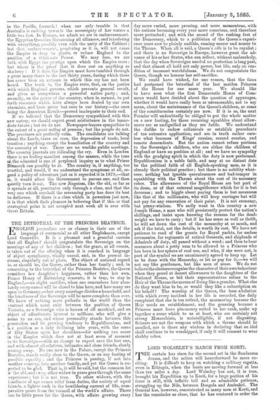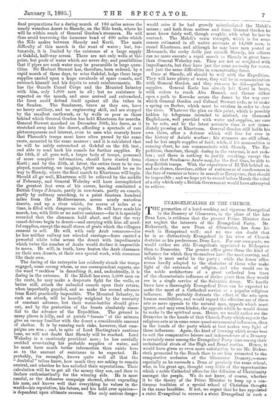LORD WOLSELEY'S MARCH FROM KORTI. T HE curtain has risen for
the second act in the Soudanese drama, and the action will henceforward be more exciting. It is difficult to keep on watching a military regatta, even in Ethiopia, when the boats are moving forward at less than ten miles a day. Lord Wolseley has not, it is true, brought his Expedition up to Korti, for a large portion of his force is still, with infinite toil and an admirable patience, struggling up the Nile, between Dongola and Ambnkol. The General has, however, concentrated so many men at Korti, and has the remainder so close, that he has ventured to order the
final preparations for a daring march of 180 miles across the nearly waterless desert to Shendy, on the Nile bank, where he will be within reach of General Gordon's steamers. He will thus avoid traversing the immense bend of 400 miles which the Nile makes between Shendy and Korti. The main difficulty of this march is the want of water ; but, fortunately, it is limited by the existence of a large supply at Gakdul, half-way across. There are not only wells at this point, but pools of water which are never dry, and possibilities that if pipes are sunk water may be procurable in large quantities. Sir Herbert Stewart has, therefore, been ordered, by a rapid march of three days, to seize Gakdul, lodge there large supplies carried upon a huge cavalcade of spare camels, and entrench himself and his depots to await reinforcements. He has the Guards Camel Corps and the Mounted Infantry with him, only 1,800 men in all ; but no resistance is expected on the march, and once arrived and entrenched, the force could defend itself against all the tribes in the Soudan. The Soudanese, brave as they are, have no heavy artillery, and no engineering skill, and are stopped by the smallest earthwork, or by walls as poor as those behind which General Gordon has held Khartoum for months. General Stewart marched on December 30th, his force, as it stretched away into the desert, affording a spectacle of rare picturesqueness and interest, even to men who scarcely know that Pharaoh's troops must have often passed by the same route, mounted in the same manner ; and it is calculated that he will be safely entrenched at Gakdul on the 4th inst., and able to send back his camels for further supplies. By the 18th, if all goes well, a larger body of troops, possessed of more complete information, should have started from Korti ; and by the 25th, at latest, the entire force to be employed, numbering, we imagine, 6,000 men, should be on its way to Shendy, where the final march to Khartoum will begin. Should all go well, Khartoum will be relieved by the middle of February, and General Wolseley will have accomplished the greatest feat even of his career, having conducted a British Corps d'Armee, partly in row-boats, partly on camels, partly by ordinary marching, to a point fourteen hundred miles from the Mediterranean, across nearly waterless deserts, and up a river which, for scores of miles at a time, is filled with dangerous rapids. He will have made his march, too, with little or no native assistance—for it is specially recorded that the clansmen hold aloof, and that the very camel-drivers begin to desert—and carrying with him all needful supplies, except the small stores of grain which the villagers consent to sell. He will, with only Arab resources—for he has neither railway nor wheeled carriage—have carried a powerful white tribe across the desert with impedimenta which twice the number of Arabs would declare it impossible to move. He will, in truth, have beaten the Arab clansmen on their own deserts, at their own special work, with resources like their own.
The daring of the enterprise has evidently struck the troops engaged, some among whom, as one correspondent reports, use the word " reckless " in describing it, and, undoubtedly, it is daring in the extreme. If the Mandi has even 5,000 men on the route, he may make a desperate fight for the wells, or better still, attack the unloaded camels upon their return, when imperfectly guarded, and so make the second advance from Korti practically impossible. The Mounted Infantry, in such an attack, will be heavily weighted by the necessity of constant advance, lest their water-bottles should giveout, and by the protection of the beasts absolutely essen tial to the advance of the Expedition. The ground in many places is hilly, and at points " forests " of the mimosa give an enemy familiar with the desert a considerable amount of shelter. It is by running such risks, however, that campaigns are won ; and, in spite of Lord Hartington's cautious tone, we will not doubt that Shendy will be reached. Lord Wolseley is a cautiously provident man ; he has carefully avoided over-taxing his probable supplies of water, and he must have much better information than exists here as to the amount of resistance to be expected. He probably, for example, knows quite well all that the " doubtful" tribes know, how much they are asking to remain neutral, and whether he has satisfied their expectations. Their calculation will be to get all the money they can, and then to declare enthusiastically for the winning side. He is most careful, as the Ashantee campaign showed, about expending his men, and knows well that everything he values in the world—his reputation, his future, and his hold over opinion— is dependent upon ultimate success. The only serious danger would arise if he had gravely miscalculated the Mandi's means ; and both from natives and from General Gordon he must know fairly well, though roughly, with what he has to contend. The Mandi's main strength, which is for some reason estimated in all native accounts at 14,000 men, is round Khartoum, and although he may have men posted at Metemneb, the rocky defile just outside Shendy, his officers can no more execute a rapid march to Shendy in great force than General Wolseley can. They are not so weighted with impedimenta, but they have just the same necessity for water, and just the same difficulties in concentrating force. Once at Shendy, all should be well with the Expedition. They will have plenty of water, they will be in communication with General Gordon, and they can—as he did—gather in supplies. General Earle has already left Korti in boats, with orders to reach Abu Hamad, and thence either open a path to Korosko across the desert by the way over which General Gordon and Colonel Stewart rode, or to make a spring on Berber, which must be retaken in order to clear the river. Whatever the plan on this point, which is possibly hidden by telegrams intended to mislead, six thousand Englishmen, well provided with water and supplies, are sure to be safe, and by the latest accounts time is not immediately pressing at Khartoum. General Gordon still holds his own there, after a defence which will live for ever in the history of Asiatic warfare ; his steamers are still afloat, and he has ample supplies of food ; while, if li;s ammunition is running short, he can communicate with Shendy. The Expedition, therefore, though daring in the extreme, is not reckless ; and there is nothing to justify croaking, except the chance that Soudanese Arabs may, for the first time, be able to stop British troops. With the experience of El Teb behind us, and no chance, therefore, either of rashness or of carelessness in the face of enemies as brave in assault as Europeans, that should be impossible ; and we hope yet to record before March the relief of a city which only a British Government would have attempted to relieve.











































 Previous page
Previous page